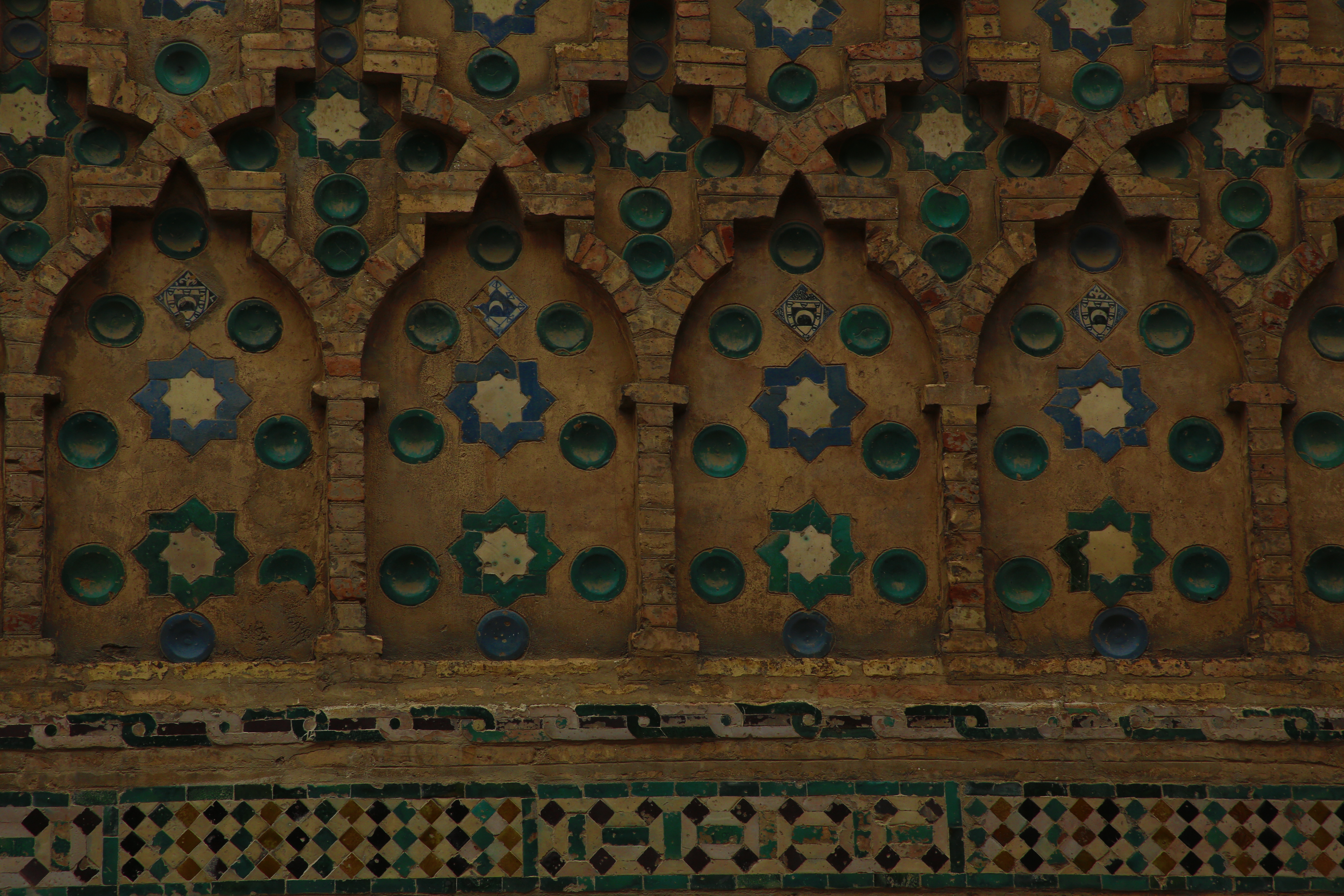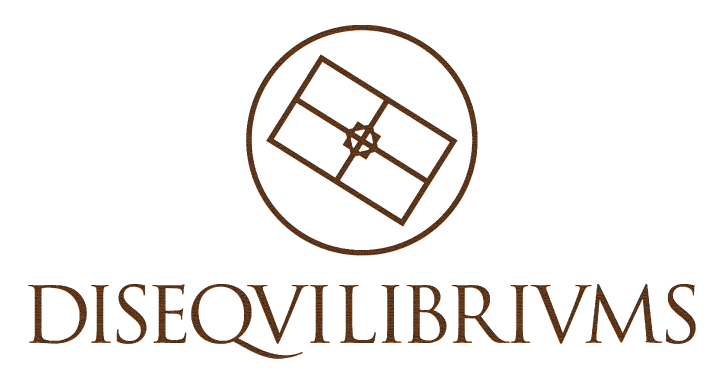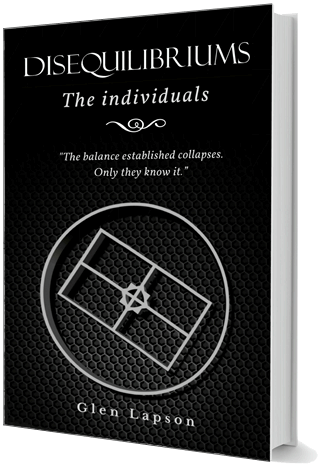DISEQUILIBRIUMS The Individuals. Chapter 36
Friday 23 December 2016
Time: 1:30 am
David

I can’t stand it! No one is making a decision. We have a pile of information on the table and we don’t know what to do. After the most important days of our lives, we have arrived at a special point. How I have changed. As a person who has always waited for all the information before deciding, I am the one who is now put out if we don’t make a decision quickly. Sofia must have infected me.
I get up and pace around the table a couple of times. Everyone asks me if I am OK. I continue pacing. Suddenly, Sofia grabs my arm and says,
“Stop, you are making us nervous. What are you doing?”
“I am pacing around,” I respond.
“And what rubbish is this?” Erik asks.
“I’m doing the same as you. The only difference is that you are all seated around the table and with a lot of information in front of you: going around in circles.” I retort and I get my own way. I have broken the impasse.
Elsa can’t stop looking at me and smiling. What I have done must have seemed friendly to her. I sit down between her and Sofia. I carefully open the parchment Nicola has given us and put a blank sheet of paper in the middle of the table so that we can all see.
I start drawing as I speak:
“Let’s see. We have on one side a stone which was in the Eastern Gate,” and I draw on the middle of the page a small rectangle, “which has two parts, one with an inscription we can understand.” I draw a vertical line dividing the rectangle into two equal parts. “We know that on one side of the rectangle, used to ‘travel’ back to Rome, it has something to do with the god Janus.” I draw two lines from the left side of the rectangle to the top where at one end, I put Jump to Rome and at the other end Janus.
I look at the faces of the rest of the group. Something has changed. On my right, Elsa and Samuel, next to her and then Erik and Sofia on my left, they are all following my drawing and thinking at the same time. Sofia looks at me differently. She has released Erik’s hand.
I take advantage of the moment and continue speaking:
“In addition, there is the relationship with the golden number.” I draw a line from the right side of the small rectangle to the right side of the paper and at the end of it, I put the PHI. “On the other side, we have the design of the city with the tilted solstice rectangle,” and I draw only in the central area below, “which we have said is linked to the four elements of nature,” I put a small circle in the half of each side of the solstice rectangle, “with the fifth element in ether in the centre.”
I am going to draw another circle in the centre so that it is clear.
Guessing what I was about to do, Elsa puts her left hand on my right arm and interrupts me, “Wait, don’t do a circle…”
We all look at her. Internally, I try to anticipate what she is going to say, but she forestalls me.
“… at the intersection, there is an eight-pointed star.”
We had seen this small figure at the beginning, but we hadn’t mentioned it.
“The eight-pointed star, the polygon of eight sides, the octagon is…” Samuel jumps to his feet and startles us all. “It’s…”
He is pacing around the table too. He looks like a kid. He walks and laughs. He looks at us and laughs again. This guy sure has a problem! Suddenly, he stops again and, looking at us as he has never done before, he asks:
“Don’t you see it?”
We are absolutely nonplussed as if struck down in a boxing match. He’s left us on the ground. From our expressions, I can see that none of us is following what he is saying. We must be light years away from his mind.
It’s almost funny because he keeps running his hands through his hair. As Nicola has the heating turned down low, he hasn’t taken off his long coat. So he presents a rather jokey picture.
At last he deigns to enlighten us. Although I suspect that it’s the killer look that Sofia threw him that may have more to do with getting him to calm him.
“Balance!”
He looks at us all with his eyes fully open and his eyebrows raised high. For the second time, I must admit that I feel even more lost.
“Balance!” At last, he sits down and continues speaking more calmly. “The number eight in ancient times was linked to equity, with balance.”
He gives us a few seconds to get even more impressed. I get up and then go back to my chair. I don’t know how I feel, but I can’t shake off the feeling that I’ve been in a dream for several days.
“It comes from Ancient Greece, from Pythagoras. I don’t remember the whole story at the moment, but what I do remember is that the number eight is a number of great power. It was called the Universal Harmony and was linked to the celestial octave, to love, friendship, prudence and inventiveness.”
Then, he becomes serious, looks out the window and continues:
“What is true is that the first moment I began to think about this was when we were in the Plaza San Felipe and were walking on the octagon at the base of the old tower. I remember noting down a large number eight in my notepad.”
He looks at our faces. I don’t know what he’s looking for or what he has discovered in our eyes because mine are like a well which keeps filling up with absolutely incredible information.
“And how do you know all of this?” Elsa asks him very gently.
“From Disequilibriums,” he answers looking at her. At last, he stopped passing his hand through his hair. “As I told you before, I managed to get onto their online forum for a time.”
He sits down. He leans back on his chair as if he had just discovered the moon and was telling us about it for the first time.
“One of the members said it and of all the content shared on the forum, it received the most ‘likes’ while I was active.”
We continue looking at him in silence.
“It is true that the symbol has eight points. It is not exactly an octagon even though it’s made up of two tilted squares,” Sofia says as she looks at the drawing I’ve done. It is clear that we have all seen it in many places in the city, in the old buildings and paintings.
Startled by the sound of snoring, we look at each other and smile.
“How is this guy able to sleep with all the noise we are making?” Erik remarks.
We look again at the material scattered on the table, moving around slowly so as not to wake him up. I finish drawing the two small tilted squares, emphasising the outlines of everything.
“OK,” I continue, as if the interruption by Samuel had not taken place because I don’t know if it changes what we are doing, apart from the idea of balance of course. “On the other hand, we have the symbols.” I draw the circle around the tilted solstice rectangle like the one we see in Nicola’s house.
I look around Nicola’s house and start drawing again, but this time in silence. Around the word Janus, I draw a head quickly to represent the god’s head.
At that moment, Sofia picks up a pencil and in total silence writes ‘My father’. I suppose it’s not going too well. It must all be very difficult for her. I’m not surprised that she has written it next to the words ‘Jump to Rome’ which I had written earlier. I’m no longer haunted by the memory of the kiss in the kitchen as often as I was. At last, I am managing to focus on what we’re doing. She’s very pretty, but sad at the same time. However, I’m her friend and I must help her.
“Thank you, Sofia,” I say to encourage her, making an effort to smile. She looks at me and returns the smile, although not with her usual happy expression.
Erik now picks up the pencil and on the right, in a completely isolated area, he writes ‘Tune for Jump’. I add ‘Emperor Augustus’ under the tilted solstice rectangle. Thereupon, Erik writes ‘Sacred City’ under what I’ve written.
Samuel picks up the pencil, approaches the centre of the paper and stops. He looks at the drawing that we have done and putting the pencil back down, he stands back. I don’t know if he has written what he was thinking about because he wasn’t sure or because he thought that we won’t understand. I look at him, but he has already moved away to search for something on his tablet.
We stand in silence looking at what we’ve drawn. Slowly, we begin to draw lines to link up parts of the drawing with others. Elsa links the PHI to the solstice rectangle.
We link all the parts we have put down on the paper. I look at the paper again. I see that the ‘Tune for Jump’ is alone, without a link to anything else. But something seems to be missing on this drawing.
Suddenly, Sofia picks up the pencil and writes the word ‘Unbalanced’. First, she puts it above the solstice rectangle. Then, she erases it. She has doubts. I think that she doesn’t know where to put it. I can’t help her either, because there at the bottom is the basis of all of this, and perhaps the opposite: ‘BALANCE’. But the consequence we’ve been observing is that people are losing their balance and I can’t help remembering my mother. I should be with her if she wakes up. I’m a bad son. No! I have to stop blaming myself. I know that I cannot be there. So, when I manage to calm down, I take the pencil carefully from Sofia’s hand (not without touching her a little). As I write, I say aloud:
“I am sure that, in the era of Augustus, they wrote in another way.” I write the word ‘Disequilibriums’ at the bottom of the sheet.
I look at the others and I see that they all agree. We look at the sheet again. I like it all, apart from leaving the ‘tune’ all alone. I check to see that we are all looking at it, but we still can’t make the first step.
“Elsa,” I break the silence, “what is the PHI number?”
“I don’t know it offhand…” She remains quiet for a moment. Then she says, “but we could calculate it.”
Quickly, she picks up the pencil and begins to write the numbers of the Fibonacci sequence which she had explained before from top to bottom: 1, 2, 3, 5, 8, 13… and so, by always adding the two last numbers to calculate the following, she puts the last number to the right of each number, the division sign between both and begins to divide the first numbers.
I realise what she’s doing. So, I continue the Fibonacci sequence below and put the last number at the side. When I get tired, I choose a division and start to do it on the side. Erik and Sofia have each taken one and are also doing divisions. Samuel also does it on his tablet. Doing divisions at 2 o’clock in the morning is not the most exciting thing for a 16 year old, but I glance at the others and we are all absolutely focused on what we are doing.
After some time, we all put down our pencils, and we look at the different divisions. I start to put down numbers until they agree:
1.6180339887498948420458683…
“I think we’ve got you!” I exclaim, looking at the paper and indicating the number with the pencil.
“Well yes,” Samuel responds with his marked local accent as he shows us the same number on his tablet screen. “You have been as quick as the programme I have here. Congratulations!”
He makes us smile, but we’re too tired to lose our focus. We feel proud of ourselves. For a while, I have this same feeling of friendship again, which is as strong as I’ve felt it before. Working with them, being so united is creating an incredible feeling of closeness.
But after five minutes of silence, no one says or does anything. It seems that we are stuck again. I think we are getting used to it and, deep down, I know that, in the end, it will all work out. Suddenly, Erik picks up the pencil and draws a line on the drawing linking the ‘PHI’ to the ‘tune FOR the Jump’. We are silent and we hear him beginning to whistle. I don’t understand anything. I don’t know what he’s doing. What I do know, however, is that Erik has music in his blood and will be able to combine anything with music.
“Erik needs an instrument,” Sofia says aloud.
What a very strange idea! In any case, in a few hours we need to find the tune that Nicola told us about in order to do the jump. I observe him and also Sofia, and I notice that she is looking at me strangely. I put on a face to say I don’t understand and then, she suddenly elbows me in the side.
But, it was not the nudge from her arm that made me realise what she wanted to tell me, but the impact of the dulzaina I’m carrying in my pocket on this side of my ribs.
“Here, take it,” I say to Erik, with a smile, as I take out the instrument and hand it to him.
They must be asking themselves what I’m doing with a dulzaina in the early hours of Friday morning. Now I remember that when we were leaving my house I realised that we had to get ready to make the jump and that Nicola had told us about the music. It was a reflex action when I saw my brother’s dulzaina from school. So, let’s see what Erik can do.
On a sheet of paper, Erik writes numbers from one to seven on a sheet of paper and, next to it, in a second column, he writes musical notes starting from C. When he reaches number eight, he stops.
| 1 | C |
| 2 | D |
| 3 | E |
| 4 | F |
| 5 | G |
| 6 | A |
| 7 | B |
| 8 |
Why had it not occurred to me before?
“What is happening, Erik?” I ask him.
I can’t disguise my anxiety at his discovery and how he suddenly seems to be stuck. I would continue to write the sequence.
“We are taking the scale of C Major,” without taking his eyes from what he has written as if trying to continue his internal deduction, “because it is the most widely used in Western music.” He speaks like an expert. “We will therefore exclude the black piano notes, and use C as the tonic note. That leaves us with C, D, E, F, G, A, and B, without sharps or flats. So 7 notes, but our code is based on 10: 9 numbers plus zero.”
Samuel stretches his arms over the paper and makes little drawings with his fingers on the numbers. Then, suddenly to everyone’s surprise, he bends forward and buries his head between his arms. Sofia looks at me and frowns. Elsa is nervous. She looks at Erik and at me, not knowing what to do.
Samuel continues to be silent with his head still buried in his arms.
“But…” Erik says without looking away from the paper. He scratches his head and continues speaking, “At this point, we have to resolve the problem of having a scale based on 7 while our code is based on 10.” He looks in Samuel’s direction as if seeking his approval. “Our first code ends in 8. Precisely 8.”
“THE NUMBER OF INFINITY!” Samuel shouts out, without raising his head.
Now they have lost me! I hope they explain it because I am beginning to feel cold and sleepy at the same time. With a such a long delay, I’m not sure we are going to succeed.
“Don’t you see?” Samuel stands up and points at what Erik has written.
No one is smiling. I think that it is the second time tonight that he has taken us for fools, although I have to admit that he amazed us before.
“When Erik reached 8 on the scale he was doing,” he explained, “I saw it and I suppose he did too, and that’s why he stopped.”
He stops and stares at our Swedish friend. Elsa is totally impressed. She is also staring at Erik.
“8 is the only number in a scale of 8 with two interpretations,” Erik explains. “8 refers to C again, so that it takes us back to the same note, but at an octave higher. This establishes an infinite loop… So 9 would be D and if our system were not decimal, we would continue like this ad infinitum always going back to 8, in the first instance, in a clearly defined loop.”
Sofia is silent. She looks at all of us. I think she doesn’t know what to do. Her ability to make decisions, as she has always done before, seems to have abandoned her. This problem, together with the disappearance of her father, has changed her.
My mind keeps going round and round in circles. The symbol of infinity! How is it possible? Is this all a coincidence? The symbol that Samuel has on his profile, it’s the same one that appeared on the projection at my home when they blocked our conversation. And furthermore, it is linked to the octagon, as a symbol of balance, and to the 8-pointed star.
No one is speaking. We are all looking at the numbers.
“Very well,” I say, hitting the table. “So we have the ‘8’, the symbol of infinity. So, what is it for? How do we continue the music? I have no idea,” I fix my eyes on Erik who is gazing at me with an almost distant look.
He has all the pressure on his shoulders at this moment, because even Samuel is looking at him too.
“OK,” Erik starts again, sitting up straight on the chair and taking up the paper and the pen again. “I am going to consider the ‘0’ as a ‘silence’.” He is serious and very focused. At last, he takes command of the situation and says, “So, our first sequence 1618 would be C, A, C, Top C (an octave higher).”
Now he substitutes the PHI number with musical notes.
1=C; 6=A; 1=C; 8=Top C; 0=SILENCE
Erik begins to play the music, stops, starts again and, after a few seconds, is playing a tune based on the first five digits of the PHI number.
Writer: Glen Lapson © 2016
English translator: Rose Cartledge
Publisher: Fundacion ECUUP
Project: Disequilibriums
Register on the website www.disequilibriums.com/en/registred and you will receive a notification to allow you to read the chapters as they are published and updates of the project.




No Comments